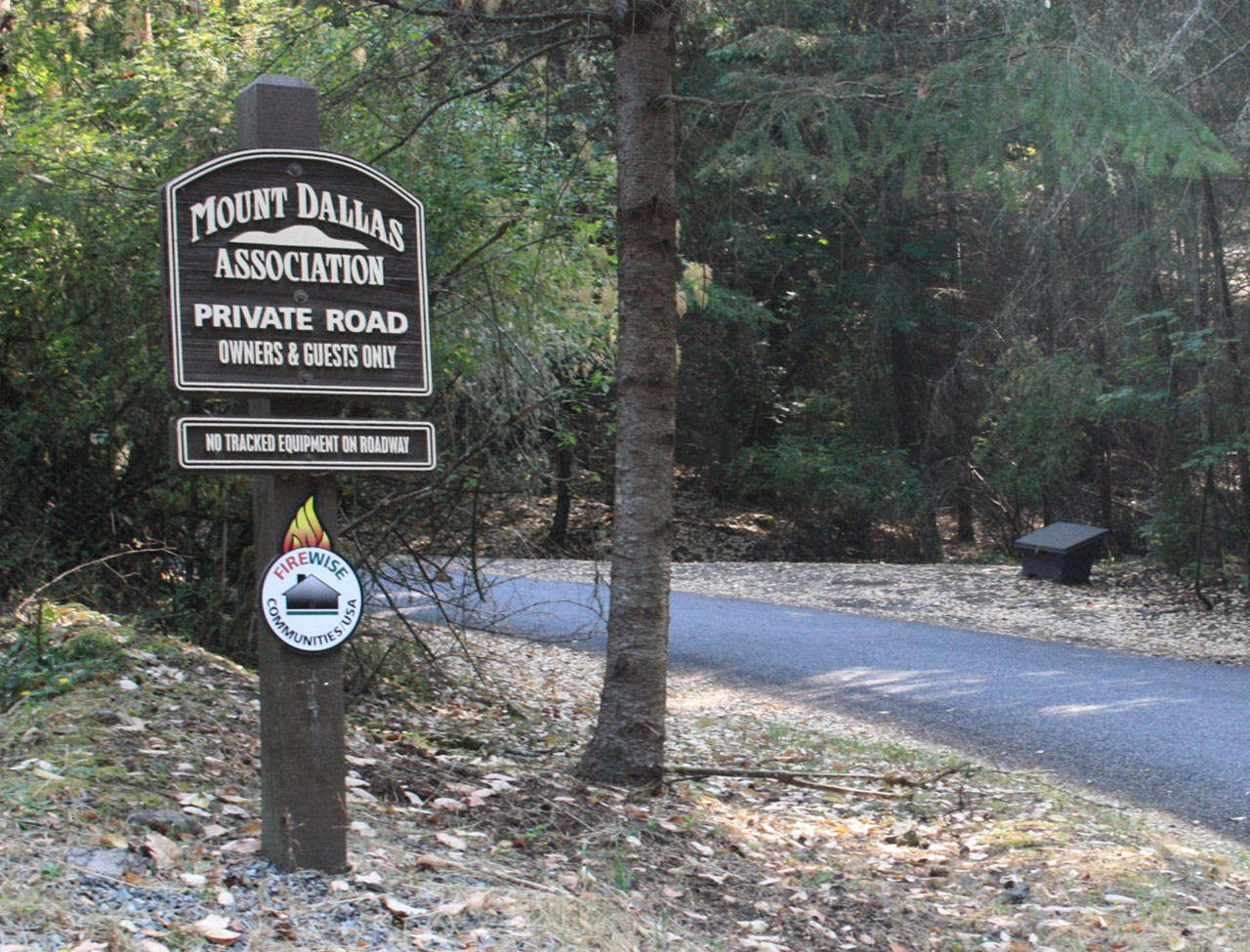A roughly three-year-old legal battle over the maintenance of a private road is one step closer to a resolution.
On Aug. 18, Judge Donald Eaton with San Juan County’s Superior Court issued a letter of recommendations on a portion of a lawsuit that was first filed in 2015. A final ruling could be made by the end of the year.
Clare and Abigail Welker, who live off Mount Dallas Road on San Juan Island, sued their neighbors to determine how to equitably pay to repave the development’s shared, private easement.
“The purpose [of the lawsuit] was to provide certainty to those who live on Mount Dallas of their obligations,” said Attorney Christopher Brain, who represents the Welkers.
There have been multiple hearings on various issues in the lawsuit, while Eaton’s most recent summary judgment refers to two July hearings. According to law.com, a summary judgment means one side recommended there were not enough facts to take certain issues in the case to trial, so the judge made recommendations about them.
Eaton’s recommendations outline “additional rights” a “managing entity” can have over the development’s property owners, including paying for road maintenance.
Complaint
Mount Dallas Road is the only access to the plaintiffs’ and defendants’ properties, as well as private side streets to some of their land. The judge’s recent recommendations include the road’s side streets, which was brought in a separate lawsuit, said Brain.
There are 64 defendants named in the 2017 updated filing of Welker versus Mount Dallas Association. The defendants own land in the development and include couples, individuals and organizations like the San Juan County Preservation Trust.
The original 2015 lawsuit states there is no road maintenance agreement for the development or homeowner’s association to mandate payment. A homeowner’s association typically makes and enforces rules for properties in a development. Defendant Rikki Swin, for instance, said she did not enter into a homeowners’ association when she bought her property.
Previously, the court ruled that a nonprofit comprised of some of the development’s residents called the Mount Dallas Association only has the right to make decisions for the those who give consent. Now, the judge’s letter states a majority vote of residents is needed to set the budget, whether the vote is collected by the Mount Dallas Association or another “managing entity.”
However, said Swin, the letter does not explain how the “managing entity” will enforce payment collection. Money can be collected in a reserve fund, states the letter, but if land owners do not pay, a lien cannot be placed on properties. Swin would have preferred a decision on payment collection.
“As I understand it, they can estimate all they want and if someone does not pay they can sue that person and let a future court decide,” said Swin. “I believe the judge passed the buck.”
The Mount Dallas Association board, as well as their lawyers, declined to the interviewed.
Recommendations
According to Superior Court Administrator Jane Severin, attorneys from both sides have the option to reach an agreement on Eaton’s Aug. 18 recommendations or they can argue their interpretation of the summary judgment at future hearings or trials.
In addition to budget and payment collection guidelines, the letter also stated property owners are responsible for paying for the maintenance of the length of the easement from the bottom of the development’s hill to their land, said Brain.
Another hearing may be needed to determine how much administrative costs residents, who are not part of the Mount Dallas Association, must pay, according to the letter. If the association’s board collects maintenance payments, some administrative costs will include assessing the road for wear and tear, while those that don’t include road maintenance, will only be billed to association members.
Owners of undeveloped property will pay less in road maintenance costs compared to owners of developed land. The discount won’t “necessarily be equally fair,” reads the letter, as owners’ use of the property varies, but the ruling is “a rough attempt to afford fairness.” The discount may be decided in a separate hearing.
A call for transparency
Before the judge’s letter, Swin said she feared this court’s ruling may give the association’s board too much power to decide maintenance payments without transparency. She wrote a letter to the Journal’s editor, stating she would like the judge to “make it less possible for some folks to take advantage of other[s].”
Now, she said, the judge’s decisions could create clarity.
“…[I]f there [was] a second ‘managing entity,’ it would go a long way to keeping the [Mount Dallas Association] transparent,” said Swin on her interpretation of the judge’s recommendations.
She’s worried about transparency because, during the last repavement, Swin said some association board members asked residents for more than the board’s agreed individual payment amounts.
Swin would like whichever “managing entity” that sets the maintenance budget to share itemized bills with property owners. In a 2016 email with the association’s board members, Swin asked for the “working copy” of the bills’ spreadsheet but was given the PDF. According to the email thread, the association member did not share the “working copy” because it took “many hours of work in develop[ing] and maintaining” it.
Swin said the case’s rulings could set a precedent on private road maintenance for the state. San Juan County Prosecuting Attorney Randall Gaylord said there is a possibility to set a precedent in every case, but it would have to reach the state’s appellate court, which could take years.



